Mercedes EQS SUV vs BMW i7 – Differences & prices compared
Compare performance, boot space, consumption and price in one view.
Find out now: which car is the better choice for you – Mercedes EQS SUV or BMW i7?
The Mercedes EQS SUV (SUV) comes with a Electric engine and Automatic transmission. In comparison, the BMW i7 (Sedan) features a Electric engine with Automatic transmission.
When it comes to boot capacity, the Mercedes EQS SUV offers 645 L, while the BMW i7 provides 500 L – depending on how much space you need. If you’re looking for more power, decide whether the 658 HP of the Mercedes EQS SUV or the 659 HP of the BMW i7 suits your needs better.
In terms of consumption, the values are 19.60 kWh per 100 km for the Mercedes EQS SUV, and 18.50 kWh for the BMW i7.
Price-wise, the Mercedes EQS SUV starts at 95000 £, while the BMW i7 is available from 99200 £. Compare all the details and find out which model fits your lifestyle best!
Mercedes EQS SUV
The Mercedes-Benz EQS SUV redefines luxury in the electric vehicle segment with its elegant design and cutting-edge technology. Its spacious interior provides exceptional comfort, featuring high-quality materials and innovative ambient lighting to create a serene driving environment. This SUV impressively combines sustainability with performance, offering a smooth and quiet ride without compromising on power.
details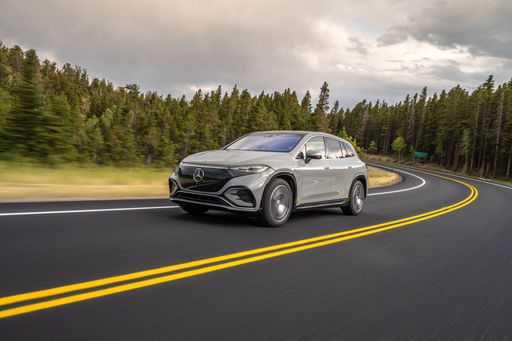 @ group-media.mercedes-benz.com
@ group-media.mercedes-benz.com
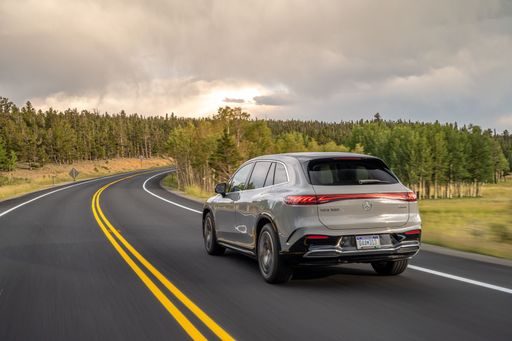 @ group-media.mercedes-benz.com
@ group-media.mercedes-benz.com
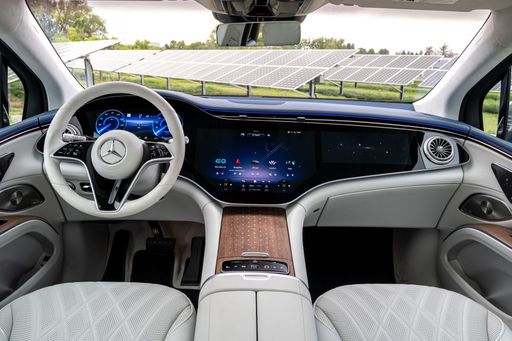 @ group-media.mercedes-benz.com
@ group-media.mercedes-benz.com
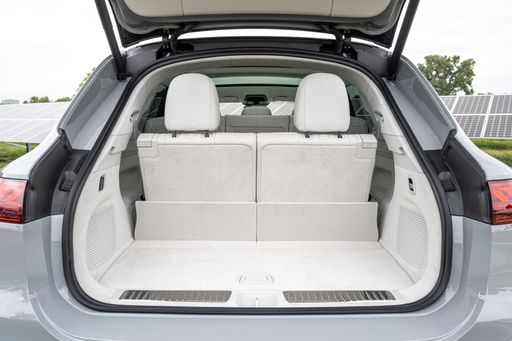 @ group-media.mercedes-benz.com
@ group-media.mercedes-benz.com
BMW i7
The new BMW i7 epitomises luxury and innovation, seamlessly blending advanced technology with elegant design. Its interior offers an unparalleled experience, with premium materials and cutting-edge features that create a tranquil yet engaging atmosphere for both driver and passengers. The i7's performance is both dynamic and efficient, demonstrating BMW's commitment to sustainable driving without compromising on the exhilarating drive the brand is known for.
details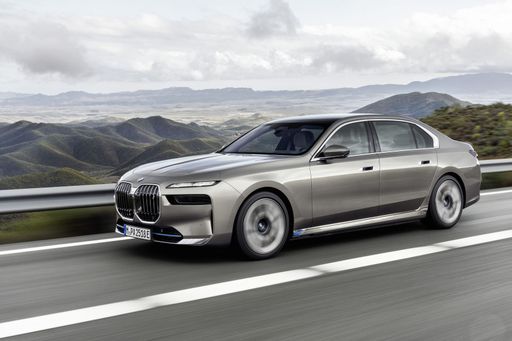 @ press.bmwgroup.com
@ press.bmwgroup.com
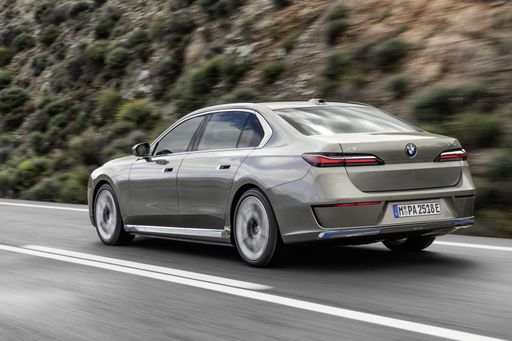 @ press.bmwgroup.com
@ press.bmwgroup.com
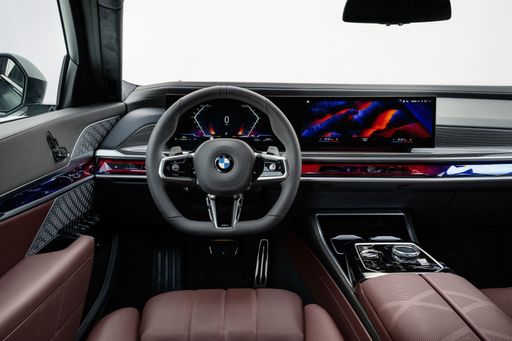 @ press.bmwgroup.com
@ press.bmwgroup.com
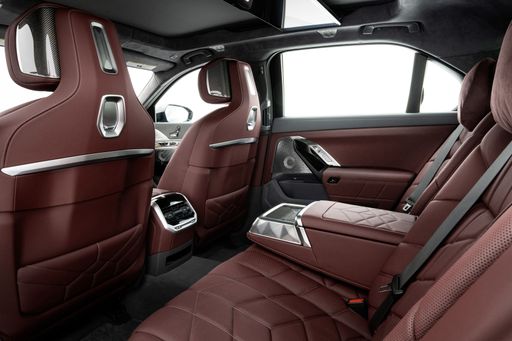 @ press.bmwgroup.com
@ press.bmwgroup.com

|

|
|
|
|
Costs and Consumption |
|
|---|---|
|
Price
95000 - 212100 £
|
Price
99200 - 157000 £
|
|
Consumption L/100km
-
|
Consumption L/100km
-
|
|
Consumption kWh/100km
19.6 - 21.9 kWh
|
Consumption kWh/100km
18.5 - 20.8 kWh
|
|
Electric Range
615 - 695 km
|
Electric Range
559 - 624 km
|
|
Battery Capacity
108.4 - 118 kWh
|
Battery Capacity
101.70 kWh
|
|
co2
0 g/km
|
co2
0 g/km
|
|
Fuel tank capacity
-
|
Fuel tank capacity
-
|
Dimensions and Body |
|
|---|---|
|
Body Type
SUV
|
Body Type
Sedan
|
|
Seats
4 - 5
|
Seats
5
|
|
Doors
5
|
Doors
4
|
|
Curb weight
2695 - 3075 kg
|
Curb weight
2595 - 2770 kg
|
|
Trunk capacity
440 - 645 L
|
Trunk capacity
500 L
|
|
Length
5125 mm
|
Length
5391 mm
|
|
Width
1959 - 2034 mm
|
Width
1950 mm
|
|
Height
1718 - 1721 mm
|
Height
1544 mm
|
|
Payload
425 - 570 kg
|
Payload
480 - 535 kg
|
Engine and Performance |
|
|---|---|
|
Engine Type
Electric
|
Engine Type
Electric
|
|
Transmission
Automatic
|
Transmission
Automatic
|
|
Transmission Detail
-
|
Transmission Detail
Reduction Gearbox
|
|
Drive Type
All-Wheel Drive, Rear-Wheel Drive
|
Drive Type
Rear-Wheel Drive, All-Wheel Drive
|
|
Power HP
360 - 658 HP
|
Power HP
455 - 659 HP
|
|
Acceleration 0-100km/h
4.4 - 6.8 s
|
Acceleration 0-100km/h
3.7 - 5.5 s
|
|
Max Speed
210 km/h
|
Max Speed
205 - 250 km/h
|
|
Torque
568 - 950 Nm
|
Torque
650 - 1100 Nm
|
|
Number of Cylinders
-
|
Number of Cylinders
-
|
|
Power kW
265 - 484 kW
|
Power kW
335 - 485 kW
|
|
Engine capacity
-
|
Engine capacity
-
|
General |
|
|---|---|
|
Model Year
2024
|
Model Year
2022 - 2023
|
|
CO2 Efficiency Class
A
|
CO2 Efficiency Class
A
|
|
Brand
Mercedes-Benz
|
Brand
BMW
|
Mercedes EQS SUV
Introduction to the Mercedes-Benz EQS SUV
The Mercedes-Benz EQS SUV stands as a testament to the capabilities of electric technology combined with luxury. Designed as an electric counterpart to its combustion-engine siblings, the EQS SUV offers opulent comfort, cutting-edge technology, and impressive performance metrics, all wrapped in a sustainable package.
Powertrain and Performance
At the heart of the EQS SUV lies a fully electric powertrain that varies across different models, offering power outputs ranging from 360 to 658 PS. These performance figures translate to an acceleration from 0 to 100 km/h in just 4.4 to 6.8 seconds, depending on the variant. The all-wheel drive configurations, with intricate dynamics and traction control, allow the EQS SUV to maintain optimal performance even in challenging conditions.
Battery and Range
The Mercedes-Benz EQS SUV offers a pioneering battery capacity of between 108.4 and 118 kWh. This substantial capacity contributes to the robust electric range of 599 to 709 km on a single charge, making long-distance travel feasible without frequent recharging stops. The efficiency of 19.1 to 22.5 kWh/100 km further demonstrates the SUV's capacity to maximise mileage while minimising energy consumption.
Interior and Comfort
Luxury is at the forefront of the EQS SUV's interior design. The cabin accommodates four to five passengers in an environment enriched with premium materials and state-of-the-art technology. The optional First Class 4MATIC line introduces seating and trim upgrades, ensuring a superior travel experience.
Technology and Innovation
The EQS SUV showcases Mercedes-Benz's commitment to innovation through features like the MBUX Hyperscreen, an expansive, high-resolution display that combines the instrument cluster, infotainment, and passenger display into a seamless unit. Advanced driver assistance systems further enhance safety and convenience, signalling Mercedes' ongoing pursuit of autonomous capabilities.
Exterior Design and Dimensions
Combining a sleek aesthetic with practical dimensions, the EQS SUV measures 5125 mm in length, 1959 to 2034 mm in width, and 1718 to 1721 mm in height. This design not only contributes to excellent aerodynamics but also maximises interior space, leading to a generous boot capacity of 440 to 645 litres.
Environmental Impact
With a CO2 efficiency class of A and zero direct emissions (0 g/km CO2), the EQS SUV embodies Mercedes-Benz’s commitment to a sustainable future. This electric SUV represents a key step in the company’s vision of electrification and reducing the automotive industry’s carbon footprint.
Conclusion
The Mercedes-Benz EQS SUV merges luxury with the practicality required for modern living, all while championing sustainability. Its wide range of performance options, expansive range, and innovative technologies make it a strong contender in the electric vehicle landscape, setting new standards for premium electric SUVs.
BMW i7
The Pinnacle of Electric Luxury: BMW i7
Introducing the BMW i7, the latest in electric innovation from one of the world's premier automobile manufacturers. Blending cutting-edge technology with luxurious comfort, the i7 represents a significant leap forward in the electric vehicle (EV) market. This article delves into the technical specifications and innovative features that set the BMW i7 apart from its competitors.
Powerful Electric Performance
Under the sleek exterior of the BMW i7 lies a powerhouse of electric capabilities. Depending on the model configuration, the i7 offers between 455 and 660 PS, with a torque of up to 1100 Nm. This ensures an exhilarating driving experience, whether you choose the rear-wheel drive or all-wheel drive configuration. The acceleration is equally impressive, with the i7 capable of going from 0 to 100 km/h in just 3.7 to 5.5 seconds.
Efficient Energy Consumption
The efficiency of the BMW i7 is noteworthy, with an energy consumption ranging from 18.5 to 20.8 kWh/100 km. This efficiency, combined with a substantial battery capacity of 101.7 kWh, gives the i7 an electric range of between 559 and 623 kilometres. BMW’s commitment to sustainability is further underscored by its zero CO2 emissions, reinforcing its status as a premium yet environmentally conscious choice.
Sophisticated Interior and Technology
Inside, the BMW i7 is the epitome of luxury. With seating for five, the interior exudes elegance and comfort. Advanced technology is at your fingertips with features such as the latest iDrive system, providing seamless connectivity and enhanced control over vehicle functions. The i7 ensures you travel in style with its sophisticated Design Pure Excellence, M Sport package, and M Sport package Pro interior trims.
Dimensions and Capacity
The i7’s ample dimensions – with a length of 5391 mm, width of 1950 mm, and height of 1544 mm – are matched by its generous luggage capacity of 500 litres, ensuring practicality alongside luxury. The car's robust build is complemented by a payload capacity of between 480 to 535 kg, ensuring the i7 is as functional as it is stylish.
Cost and Efficiency
With prices ranging from €115,700 to €181,800, the i7 is positioned as a high-end vehicle offering value through its advanced features and performance. The monthly operating costs range between €2,143 and €3,027, while the cost per kilometre is approximately 85.7 to 121.1 cents. Despite its upscale market positioning, the i7 offers competitive efficiency with its remarkable CO2 emission-free driving and energy-saving technologies.
Conclusion
The BMW i7 stands as a testament to the brand’s innovation and dedication to sustainable luxury. By marrying performance, efficiency, and cutting-edge technology, BMW has ensured that the i7 not only meets but exceeds the expectations of discerning EV enthusiasts. The i7 is not merely a car; it is a statement of intent in the future of sustainable luxury. Experience the future today with the BMW i7.
Which drive types are available for the Mercedes EQS SUV?
Available as All-Wheel Drive or Rear-Wheel Drive.
The prices and data displayed are estimates based on German list prices and may vary by country. This information is not legally binding.
